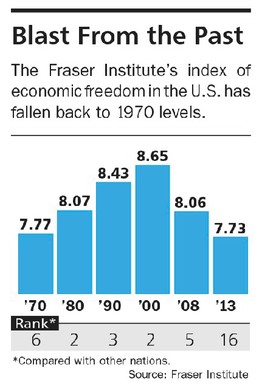
Gene Epstein devotes his “Economic Beat” column in Barron’s to the link between the decline in American economic freedom and sluggish economic growth.
U.S. economic growth over the past 45 years can be broken down into two eras. In each of three decades from 1970 through 2000, growth of real gross domestic product exceeded 3% a year. Since 2000, however, growth has slowed to 1.7%-1.8% per year, dismal rates that apply whether we look at 2000-2008 or 2000-2013 or 2000-2015.
The Fraser Institute’s economic freedom index for the U.S. has had a similar trajectory. The index—which tracks the degree to which free-market capitalism is allowed to operate—rose every decade from 1970 to 2000, which coincided with the extended period of relatively strong growth. Since 2000, however, the index has fallen, coinciding with the period of relatively weak growth.
The decline in the index occurred whether we take the period from 2000 through 2008 (the last full year of the George W. Bush administration), or from 2008 through 2013, the most recent year for which full data on the index are available (see chart). This correlation between economic freedom and rates of economic growth is not coincidental, but causal, as numerous scholarly papers have shown.
Some might wonder if we’re distorting the recent U.S. record by including the contraction of the Great Recession of 2008-09. But the 1970s and 1980s also suffered major downturns, and contrary to myth, recessions are also a reflection of weaker economic freedom, as the Great Recession itself demonstrates. Even if we focus solely on periods of expansion, the pattern is the same, with each of five expansions from 1970 to 2000 running noticeably higher than the two expansions since 2000.
Levels of the economic freedom index also matter. Rich countries enjoy higher levels of economic freedom, and vice versa. Out of 157 countries surveyed as of 2013, the U.S. still ranks 16th, at a rating of 7.73 out of a possible 10, with Hong Kong (8.97) in the top spot and Venezuela (3.23) at the bottom. And since economic freedom is not about the privileges of the few but the opportunities of the many, incomes of the very poorest are much higher in freer countries than in those less free.


